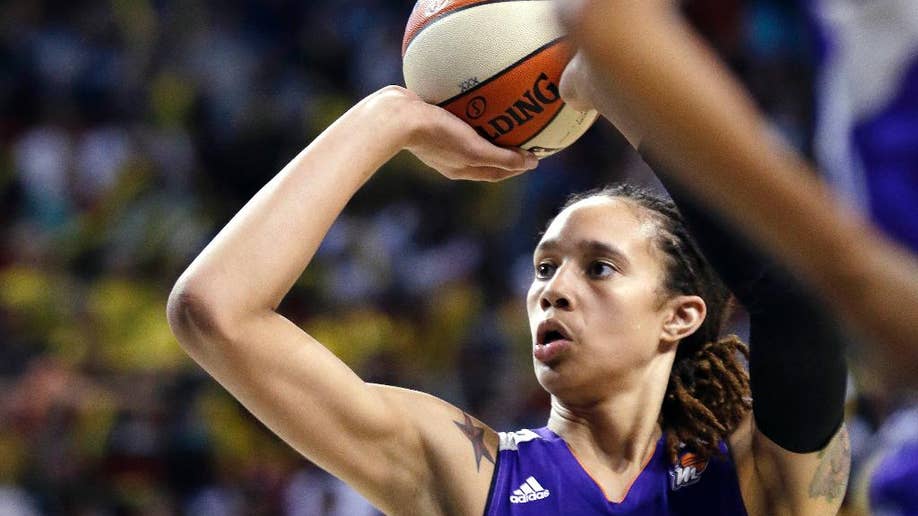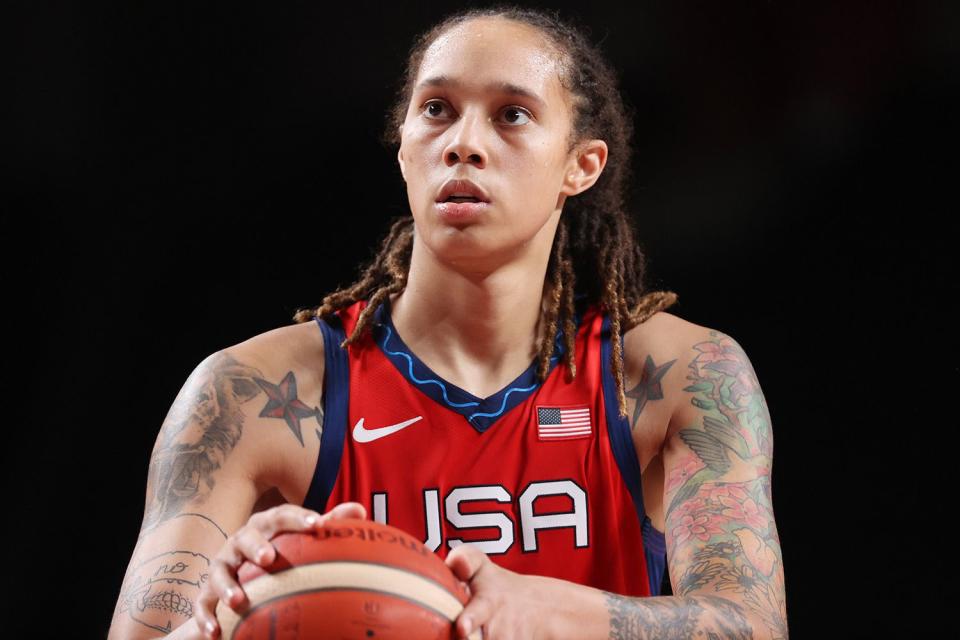Understanding Brittany Griner: Is Brittany Griner Transgender?
Brittany Griner, a celebrated figure in women's basketball, has captured the attention of sports enthusiasts and the general public alike. As her career continues to flourish, curiosity surrounding her identity has emerged, particularly regarding the question: is Brittany Griner transgender? This inquiry not only stems from her athletic prowess but also from the evolving conversation about gender identity in today's society. Griner, who plays for the Phoenix Mercury in the WNBA, has also represented the United States in international competition, showcasing her exceptional talent on various stages. With her towering height and unique playing style, she has become an icon, inspiring many young athletes across the globe.
In recent years, discussions about gender identity have gained significant traction, leading to increased awareness and understanding. The question of whether Brittany Griner is transgender has arisen amid these discussions, prompting fans and observers to delve deeper into her life and experiences. The exploration of Griner's identity is not merely about labels but also about the broader implications of understanding and acceptance in sports and society.
As we navigate this topic, it's essential to approach it with empathy and respect. Gender identity is a deeply personal aspect of an individual's life, and public figures like Griner often find themselves at the center of scrutiny. This article aims to provide insights into Brittany Griner's biography, her experiences, and the ongoing conversation surrounding gender identity in sports, ultimately addressing the question: is Brittany Griner transgender?
- Understanding Shiloh Joliepitts Gender Identity A Journey Of Selfdiscovery
- Understanding The Impact Of Molly Noblitt Bullying
Who is Brittany Griner? A Brief Biography
Brittany Griner was born on October 18, 1990, in Houston, Texas. She attended Cypress Creek High School, where she gained recognition for her outstanding basketball skills. Griner went on to play college basketball at Baylor University, where she led the Lady Bears to a national championship in 2012 and earned numerous accolades for her performance on the court.
Her success in college paved the way for her entry into the WNBA, where she was selected as the first overall pick in the 2013 draft by the Phoenix Mercury. Griner quickly made a name for herself, becoming a dominant presence in the league and earning multiple All-Star selections. Beyond her athletic achievements, Griner has also been an advocate for LGBTQ+ rights, using her platform to raise awareness about important social issues.
| Personal Details and Bio Data | Information |
|---|---|
| Name | Brittany Griner |
| Date of Birth | October 18, 1990 |
| Birthplace | Houston, Texas |
| Height | 6 ft 9 in (2.06 m) |
| College | Baylor University |
| WNBA Team | Phoenix Mercury |
| Position | Center |
| Career Highlights | 2× WNBA Champion, Olympic Gold Medalist |
What is Gender Identity and Why Does it Matter?
Before addressing whether Brittany Griner is transgender, it's vital to understand what gender identity means. Gender identity refers to an individual's internal sense of their gender, which may or may not align with the sex they were assigned at birth. This concept is crucial in discussions about inclusivity and representation in various sectors, including sports.
In recent years, there has been a growing recognition of the importance of acknowledging and respecting individual identities. This shift has implications not only for personal well-being but also for the culture of sports, where athletes often face pressure to conform to traditional gender norms.
Is Brittany Griner Transgender? The Evidence
As of now, Brittany Griner has not publicly identified as transgender. Throughout her career, she has embraced her identity as a proud member of the LGBTQ+ community, openly discussing her experiences as a gay woman. Griner's openness has played a significant role in promoting acceptance and understanding within sports and society.
It's essential to approach the question of whether she is transgender with sensitivity and respect for her personal journey. Speculating about someone's gender identity without their consent can perpetuate harmful stereotypes and undermine the progress made toward acceptance and equality.
How Has Brittany Griner Contributed to LGBTQ+ Advocacy?
Brittany Griner has utilized her platform to advocate for LGBTQ+ rights and visibility. By being open about her sexuality, she has inspired many individuals within the community to embrace their identities and pursue their passions. Griner's advocacy goes beyond mere representation; she actively participates in initiatives aimed at raising awareness about the challenges faced by LGBTQ+ individuals.
Some of her contributions include:
- Speaking at events focused on LGBTQ+ rights and inclusion.
- Participating in campaigns that promote acceptance and understanding.
- Using her social media presence to share her experiences and connect with her audience.
What Challenges Has Brittany Griner Faced as an LGBTQ+ Athlete?
Despite her success, Brittany Griner has faced challenges as an LGBTQ+ athlete. The sports world can often be a challenging environment for individuals who do not conform to traditional gender norms. Griner's experiences reflect broader societal issues regarding acceptance and understanding of diverse identities.
Some of the challenges she has encountered include:
- Facing discrimination and prejudice from fans and peers.
- Dealing with media scrutiny regarding her appearance and identity.
- Confronting stereotypes and misconceptions about LGBTQ+ athletes.
What Can We Learn from Brittany Griner's Journey?
Brittany Griner's journey serves as a powerful reminder of the importance of acceptance and advocacy. Her openness about her identity has paved the way for greater visibility and understanding in sports. Griner's story highlights the need for continued efforts to create inclusive environments where all athletes can thrive, regardless of their gender identity or sexual orientation.
Ultimately, the question "is Brittany Griner transgender?" may not have a straightforward answer, but it opens the door for essential conversations about identity, acceptance, and representation. As society continues to evolve, it is crucial to support individuals like Griner who courageously share their stories and advocate for change.
Conclusion: A Call for Respect and Understanding
In conclusion, the inquiry into whether Brittany Griner is transgender invites us to reflect on broader issues surrounding gender identity and acceptance. While she has not identified as transgender, her experiences as a prominent LGBTQ+ athlete underscore the importance of understanding and respecting individual identities. As we continue to celebrate her achievements on and off the court, let us also commit to fostering an environment of inclusion and support for all individuals, regardless of their gender identity.
By embracing diversity and advocating for equality, we can create a world where everyone, like Brittany Griner, can thrive without fear of discrimination or prejudice. The journey toward acceptance is ongoing, and it is up to each of us to contribute to a more inclusive and understanding society.
Article Recommendations
- Nikki Catsouras Wreck A Tragic Tale Of Loss And Controversy
- Mourning The Loss The Legacy Of Molly Noblitt



Detail Author:
- Name : Freeman Kiehn
- Username : lavonne.corkery
- Email : sister80@yahoo.com
- Birthdate : 1988-09-01
- Address : 565 Gaylord Ridge Apt. 465 South Elsastad, DE 27200
- Phone : 510-471-1658
- Company : Rogahn Ltd
- Job : Set and Exhibit Designer
- Bio : Aliquid ut maxime quia quis magni. Nesciunt nam quo sit rerum asperiores accusantium fugit exercitationem. Suscipit molestiae iure nam ut inventore reprehenderit hic.
Socials
facebook:
- url : https://facebook.com/diana_king
- username : diana_king
- bio : Et quis ad quam omnis. Provident hic deleniti rem molestias rerum culpa.
- followers : 1903
- following : 1875
tiktok:
- url : https://tiktok.com/@dianaking
- username : dianaking
- bio : Assumenda quia recusandae unde aperiam ex. Qui eum quis qui nobis.
- followers : 3526
- following : 1226